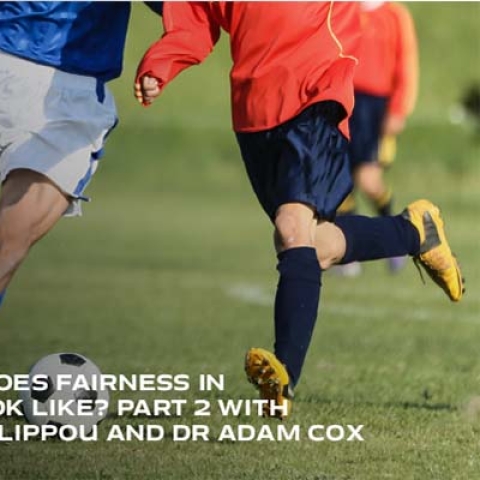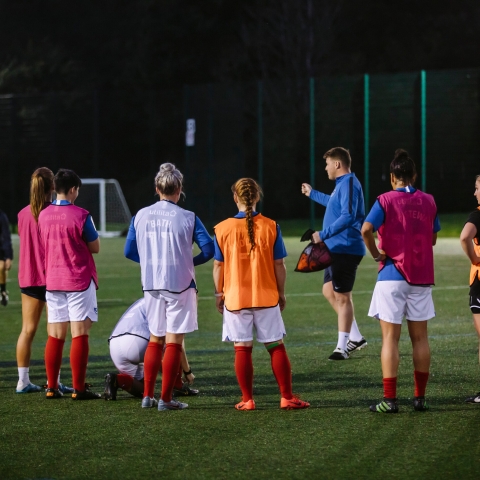

Dr Christina Philippou contributed to a major independent review into the future of domestic women’s football by former England and Great Britain footballer turned pundit Karen Carney MBE.
13 July 2023
5 minutes
Dr Christina Philippou from the University of Portsmouth has contributed to a major independent review into the future of domestic women’s football by former England and Great Britain footballer turned pundit Karen Carney MBE.
The review was commissioned by the UK Government following England’s UEFA Women’s EURO 2022 success and is published in the build-up to the FIFA Women’s World Cup 2023.
It examined the opportunities and challenges for the women’s and girls’ game - from the commercial future of the elite game to the current professional environment, the fan experience and women and girls’ experiences of participating in grassroots football.
The report recommends raising minimum standards across the game, calls for the Women’s Super League and Women’s Championship to become fully professional environments and a new dedicated broadcast slot for women’s football.

This review is so important and timely given the massive increase in interest in women’s football that we have seen at the Euros and now heading into the World Cup.
However, there are a large number of issues that arise with sudden commercialisation and participation, and ensuring that the women’s and girls’ game is safe, enjoyable, inspiring and financially sustainable is what this review is all about.
Dr Christina Philippou, Principal Lecturer in the School of Accounting, Economics and Finance
The report recommends raising minimum standards across the game, calls for the Women’s Super League and Women’s Championship to become fully professional environments and a new dedicated broadcast slot for women’s football.
Dr Philippou, Principal Lecturer in the School of Accounting, Economics and Finance, provided football finance expertise to help the review panel assess the financial viability of the various suggestions and recommendations by a range of stakeholders at the information-gathering stage. Dr Philippou’s research with Portsmouth colleagues Dr Beth Clarkson and Dr Tom Webb on the financial sustainability of the Women’s Super League was also provided to the panel.
She said: “This review is so important and timely given the massive increase in interest in women’s football that we have seen at the Euros and now heading into the World Cup.
“However, there are a large number of issues that arise with sudden commercialisation and participation, and ensuring that the women’s and girls’ game is safe, enjoyable, inspiring and financially sustainable is what this review is all about.”
Chair of the review of domestic women’s football Karen Carney MBE said: “Following the Lionesses’ unforgettable success in 2022 and as we look ahead to the World Cup, it is clear that domestic women’s football has reached a defining moment.
“This review has enabled us to get a comprehensive understanding of the state of the game, and how we can capitalise on the current momentum.
“It is clear that the women’s game in this country can become a world leading sport that not only generates immense economic and social value, but sets the standards for women’s professional sport globally.
“These recommendations must be a blueprint for how this can be achieved, and must be acted upon with urgency.”
The review makes ten recommendations:
- The new standalone company tasked with running the Women’s Super League (WSL) and Women’s Championship, NewCo, should not settle for anything less than world leading standards for players, fans, staff and everybody involved in the women’s game.
- The FA needs to fix the talent pathway to create generation after generation of world-beating Lionesses. As part of this:
- The FA should choose a strategic partner willing to invest in building a sustainable pipeline of domestic talent.
- Clubs should be allowed access to an increased pool of international talent while the domestic pathway is fixed. - The Women’s Super League and Women’s Championship should become fully professional environments designed to attract, develop and sustain the best playing talent in the world. This means the FA:
- Addressing the gulf in minimum operating standards between the two leagues (specifically minimum contact time with a player, and player salaries).
- Providing gold standard physical and mental health provision.
- Mandating elite training facilities for players.
- Mandating a world leading parental package.
- Funding full union representation to both tiers.
- Uplifting duty of care provision for players.
- Offering best-in-class career transition support for players leaving the professional game. - The FA should urgently address the lack of diversity across the women’s game - in on and off-pitch roles.
- The FA, Premier League, EFL and broadcasters should work together to carve out a new dedicated broadcast slot for women’s football (last season most WSL matches kicked off at 11.30am on Saturdays and 6.45pm on Sundays).
- Clubs must better value and support their fans - the FA should raise minimum standards to enforce this.
- The Government must deliver on recent commitments around equal access to school sports for girls.
- Everyone involved in funding grassroots facilities - the Government, local authorities, the FA and Premier League - must come together to increase investment to accommodate meaningful access for women and girls to play sport.
- The FA, Premier League and Football Foundation should work together to make sure women and girls are benefitting from funding flowing into facilities across the pyramid.
- As the FA hands over the responsibility for running the Women’s Super League and Championship to NewCo, it must now place more focus on the development of grassroots clubs and the rest of the women’s football pyramid.
The findings and recommendations have been developed with the support of a panel of experts. It includes former professional footballer turned pundit Ian Wright, former Lionesses Head Coach Hope Powell, Chair of the Professional Game Academy Audit Company and Director of the Women in Football group Jane Purdon, NFL Head of Europe and UK and former CEO of World Rugby Brett Gosper, former Deloitte Global Lead Partner for Sports Business Dan Jones and Secretary General of the International Working Group on Women and Sport Lisa O’Keefe.
The Government will set out its full response to the recommendations in the autumn.
Other media content from Dr Philippou
What does fairness in football look like? Part 2: Corruption
1 March 2022
25 min listen

Women’s World Cup: Fifa’s threat to ban European broadcasters is not a skilful move
15 May 2023
4 min read

How women’s football can avoid being corrupted when more money comes its way
Christina Philippou
4 August 2022
4 min read

